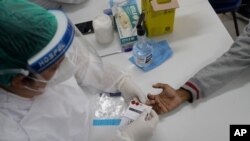Vaccination programs against some of the world’s deadliest diseases have saved tens of millions of lives over the past twenty years, according to a new study. However, the researchers warn that continued progress is threatened by the coronavirus pandemic.
The scientists from the Vaccine Impact Modelling Consortium, funded by Gavi, the Vaccine Alliance, and the Bill & Melinda Gates Foundation, looked at vaccination programs over the past two decades targeting ten infectious diseases across 112 low- and middle-income countries.
They found that some 50 million lives have been saved by vaccines, most of them children.
The diseases the researchers looked at included measles, hepatitis B, human papillomavirus (HPV), yellow fever, Haemophilus influenzae type b, Streptococcus pneumoniae, rubella, rotavirus, Neisseria meningitidis serogroup A, and Japanese encephalitis.
The study is the largest assessment of vaccine impact before the start of the COVID-19 pandemic.
Dr. Katy Gaythorpe, a co-author of the report at Imperial College London, told VOA that the successes of the past two decades would be replicated if progress in vaccination programs can be sustained.
“If we continued with the vaccinations in our projections, so beyond 2019, we’d avert another 47 million deaths — so huge numbers,” Gaythorpe said. “And really what we wanted to show in this paper is this is what we projected vaccination to look like before the COVID pandemic. And we wanted to emphasize these long-term effects, these long-term benefits of vaccination going into the future.”
Immunization programs have added benefits beyond the prevention of specific diseases.
“For example, if people aren’t getting sick of vaccine-preventable diseases then that means there’s less stress on healthcare due to those infections, which means you could potentially be treating people for other things,” Gaythorpe said.
But the researchers warn that the COVID-19 pandemic has disrupted vaccination programs — and could lead to a decline in coverage.
“We’ve got not only healthcare services stretched by possibly treating people infected with COVID, we’ve also got people’s personal choice — you know, they might put off going to seek immunization just because of fear surrounding being infected with COVID,” Gaythorpe said.
The World Health Organization earlier this year launched its “immunization agenda 2030” to try to get vaccine programs back on track and reach even more people.
“It would mean reducing by half the children who are completely left out of essential vaccines — the ‘zero dose children’ — [and] it would mean achieving another 500 introductions of new and underused vaccines in low- and middle-income countries,” the WHO’s Vaccines Department chief Kate O'Brien told reporters in April.
Scientists say the huge number of lives saved demonstrates the stunning advances in modern medicine — and the importance of keeping other vaccine programs on track, alongside tackling the COVID pandemic.






